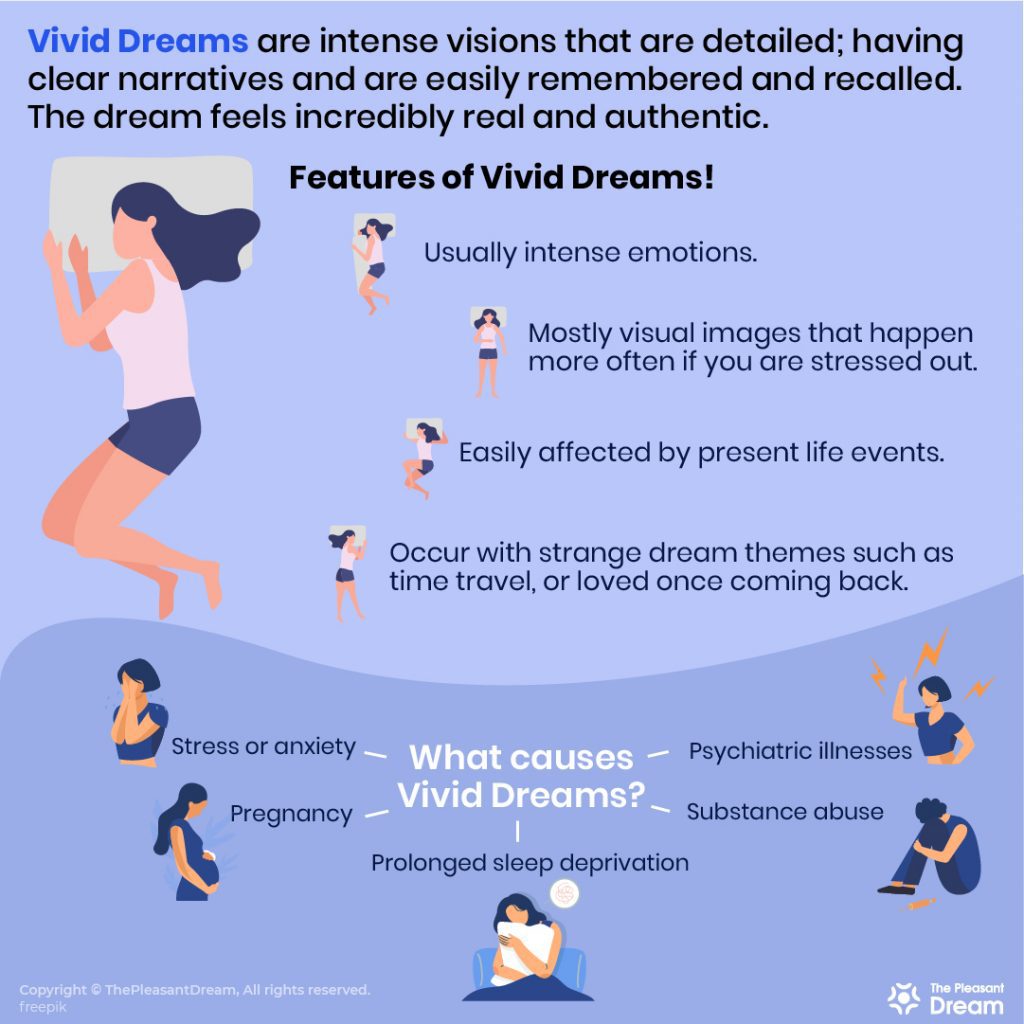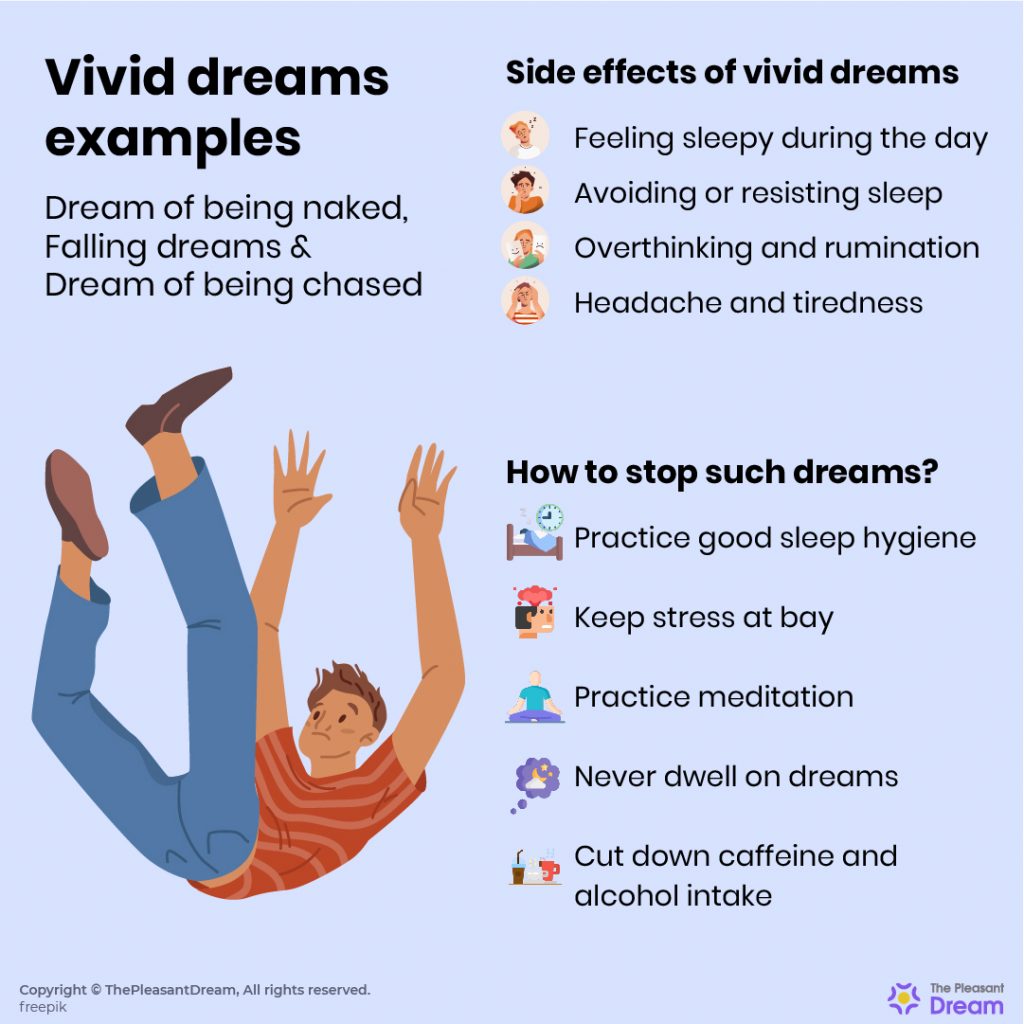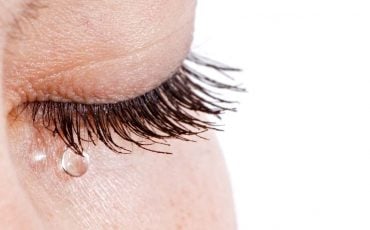Were you dreaming of something intense and life like; just when the alarm bell woke you up? The vision felt unbelievably real and it took a few minutes to realize that it was just a vivid dream.
These dream narratives are clear, distinct and you may feel that something just happened realistically around you. These dreams never ease out from the conscious mind and leave a deep imprint in your ‘psyche’.


What are Vivid Dreams?
SUMMARY
Vivid dreams are intense visions that are detailed; having clear narratives and are easily remembered and recalled. The dream feels incredibly real and authentic as if things were just happening in waking life.
The term ‘vivid’ means a strong and clear impression that has a lasting effect on the mind. Vivid dreams are distinct imaginations that are detailed descriptions of either some latent wishes or deepest fears of the unconscious mind or it may be a weird dream vision that is not at all connected to reality.
Your vivid dreams feel real because they go on for a long time and always occur during REM (Rapid eye movement) sleep stage. The first REM stage starts 90 minutes after you fall asleep.
Vivid dreams can either be happy themes or extremely upsetting experiences that may leave you baffled in no time.
Several scientific researches done on sleep and dreaming have shown that though dreaming can happen anytime throughout the night in both REM and NREM stage but it happens more intensely with a lot of details during the REM sleep stage.
Features of vivid dreams
In most cases dreams are visual images and stories that your mind creates when you’re sleeping. Your vivid dreams have the following features:
- Vivid dreams usually feature intense emotions. Few common emotions attached with such dreams are fear, embarrassment, surprise, guilt, and anger.
- These intense dreams are often ambiguous and bizarre; such as dreams of being pregnant when you are not really carrying a baby in real life.
- Vivid dreams occur with strange dream themes such as time travel, or loved ones coming back to life once again after they have passed away long ago.
- Your vivid dream themes are easier to remember and can be easily recalled after waking up because they are seen in detail with a lot of intense emotions involved in the process.
- Vivid dreams are mostly visual images that happen more often if you are stressed out, or tired in waking life.
- These dreams are easily affected by present life events
- Vivid dreams always occur during the REM stage when the brain is active and alert.
What causes vivid dreams?
SUMMARY
There are various causes of vivid dreams such as sleep deprivation. drug abuse, stress, pregnancy, medications, and sleep disorders.
Dreaming is an enigma by itself. Though several researches have been done to understand the causes of vivid dreams, still many issues remain unanswered and scientists think that the following factors may play a role in the process.
1. Stress or anxiety
The daily life issues, whether real or imagined, causes stress and anxiety and it can get relayed in the subconscious mind while dreaming. People who suffer from anxiety and worries usually get upsetting images at night and it has been backed by several researches.
Several stressful life events such as work-life balance, issues with relationships, and disagreements with friends or family, moving to a new locality or city can induce stress and harm the mental well-being of the person.
This causation of vivid dreams are also related to the concept of continuity hypothesis where researchers claimed that waking life experiences and its associated emotions are carried over to the dream state.
2. Prolonged sleep deprivation
Sleep deprivation can lead to inadequate sleep, night time waking and deeper sleep intensity and therefore more vivid dreams. One study conducted by neurologist Mark Mahowald of the University of Minnesota claimed that “When someone is sleep deprived we see greater sleep intensity, meaning greater brain activity during sleep; dreaming is definitely increased and likely more vivid.”
When you do not get enough sleep, it can affect your overall body functioning. It may lead to fatigue, irritability, difficulties in concentration and memory, and mood swings. All these conditions cause anxiety and a restless mindset, causing intense dreams.
3. Medications
Some medications that are usually related to vivid dreams are antidepressants, blood pressure medications, beta blockers, drugs given for Parkinson’s disease and other neurological ailments.
All these medications have potential side effects that can cause poor quality sleep such as difficulty in falling asleep or waking up many times during the night, a bizarre feeling of mental uneasiness etc. All these factors may lead to more vivid dreams and better recall of the dream narratives.
4. Psychiatric illnesses
People suffering from severe depression or bipolar disorders can experience vivid dreams. The dream themes show sadness, grief, failure, and it actually resembles what the patient experiences in his/her waking life.
Research studies have found that people suffering from depression actually re-live their pain and suffering through vivid dreaming. Since these people never get a deep sleep, they have difficulty processing and accepting their negative feelings.
Dreams are a way to vent out their troubling emotions and make them feel better in waking life.
5. Pregnancy
Another notable cause of vivid dreams is pregnancy. This is due to the anxiety and stress related to preparing for delivery, childbirth, and parenting responsibilities. Sometimes hormonal changes during early pregnancy can cause vivid dreams.
Thus inadequate sleep results in shallow sleep, fragmented sleep, and nighttime awakenings causing the probability of seeing anxiety-ridden dreams. Pregnant women also have more detailed dreams about their baby’s health and well-being.
6. Substance abuse
Several research findings have shown that frequent drug abuse and alcoholism can lead to vivid dreams. Substances like cocaine, marijuana can lead to poor sleep quality. The withdrawal symptoms from heavy drinking can also lead to weird dreaming.
This happens because of shallow sleep and more frequent night awakenings. A study conducted by Dr. Karen Lee, MD found the detrimental effects of evening drinking on sleep and dreaming. He found that “Alcohol consumption leads to awakening throughout the night. A lot of the sleep is interrupted and you wake up restless.”
7. Narcolepsy
Narcolepsy can cause weird and disturbing vivid dreams. This sleep disorder is characterized by daytime drowsiness, irregular sleep at night, and fatigue. Research studies suggest that people suffering from narcolepsy usually get a negative dream that goes on for a long time.
Patients with narcolepsy describe their dreams as real and life-like. It happens because the thin line between dream and wakefulness gets blurred in such a disorder.
Another thing that happens in narcolepsy is, when patients fall asleep, they shortly start with a REM stage. This means that they get into a vivid dream state even during shorts naps and siesta.
8. Excessive binge watching
Sometimes binge watching a TV series or long hours of screen time just before sleep time can actually mess up with your sleep schedule. Experts have proved that too much screen time can affect sleep patterns.
Marc L. Benton Marc L. Benton, medical director of Inpatient Sleep Services for Summit Medical Group in Madison, Morris County says that “Any form of electronic media used in close proximity to bedtime can both interfere with sleep initiation and continuity, and can also impact one’s dreams.”
9. Sleep supplements
Sleep medicines that are used to increase melatonin and induce a good amount of sleep can cause vivid dreaming. This leads to more intense REM cycles with detailed dream themes.
Melatonin acts on the circadian rhythms that regulate our sleep-wake cycles. If you’re sleep deprived for a few days and then take a supplement to improve your sleep quality, you will find that you will experience long REM sleep – it is known as REM rebound. This phenomenon can cause vivid dreams that can be easily remembered and recalled.
How to have vivid dreams?
We all dream but we do not remember the details of the dreams in a similar way. It has been found that vivid dreams are easily remembered and recalled because it feels real and lifelike. If you can train yourself to dream vividly, you may be able to recall the dreams correctly.
You may follow certain techniques and tips to habituate yourself to dream vividly and enjoy the experience attached to it.
Ensure to have quality sleep
If you want to have vivid dreams that are less stressful and can easily be recalled, you should have quality sleep. This can be done by following a consistent sleep schedule, which means going to bed and falling asleep at a particular time every day.
You can choose a comfortable place to sleep with minimal distractions around. Your dark room with dim light and absolute silence will make you sleep well. This increases the chances of a longer REM stage and as such more vivid dreams.
Maintain a dream journal
If you write down your dream narratives in a dream diary just after waking up, you will be able to recall them easily. Moreover a dream journal also helps you to know whether similar scenes and themes keep coming back or not.
Journaling your dream content and various emotions attached with it will help you to have more vivid dreams and experience the process without fear and discomfort.
Abstain from alcohol and drugs
Alcohol interferes with REM sleep and causes nightmares and negative dreams. It is advisable not to take drugs or alcohol before going to bed because you may forget the dream narrative completely after waking up.
Even if the dream was vivid, recall will be faulty because of erratic REM sleep and inadequate memory traces of what you were seeing in the dream.
Remind yourself that you’re going to dream tonight
When you say to yourself that you’re going to dream tonight, you are actually making yourself aware of what’s going to happen in the sleeping brain after you doze off.
This is known as a sleep aid that helps in dreaming and better recall of events happening in the subconscious mind.
Practice meditation before going to bed
Meditation helps in improving your sleep patterns. It keeps you calm and controls your monkey mind. You should follow a peaceful regime for about an hour before retiring to bed.
Avoid thinking about the long to-do list for the next day. It disturbs your inner peace and you might have problems falling or staying asleep. A regular mindfulness meditation improves mental clarity and concentration. You will be able to focus on things in a better way.
Avoid going to bed hungry
Your sleep quality and dreams will surely get affected if you are going to bed with an empty stomach. This happens because while you are sleeping, your blood glucose levels fall and you may wake up feeling restless and hungry.
Though research findings supporting the fact that food habits and hunger can really affect dreams or not are scarce, it has been found that dozing off in an empty stomach can cause weird dreams.
Vivid dreams examples
People dream about weird things in their dreams. The most common vivid dream examples include the following:
- Dream of being naked – This dream speaks about your fear of being exposed, it also means deepest insecurities, feeling vulnerable and weak from within.
- Falling dreams – It also symbolizes failure and uncertainty about important life events, loss of control and grip over various situations of waking life.
- Dream of being chased – This vivid dream symbolizes avoidance and overwhelming emotions. It means the demands of everyday life are trying to catch up with you but you are feeling apprehensive of whether you could ever do it properly.
- Dreams of being pregnant – Pregnancy dreams are more vivid than anything else because of the various changes that go on in the body at this time. Such a dream symbolizes creation, personal growth, and goal accomplishment.
- Teeth falling out dream – This vivid dream symbolizes poor communication skills. Inability to express yourself clearly, stress and anxiety, poor decision making ability etc.
- Illness – Another very common vivid dream is that of illness. This dream symbolizes that something bad is going to happen in the near future.
- Lost in the maze – This vivid dream is all about your deepest fears and uncertainties. Seeing yourself lost in a maze symbolizes poor self-confidence, pessimism.
- Dreams about a plane crash – A plane crash in dream is a common dream motif and it symbolizes uncertainties, anticipating failures, poor life goals, jealousy in relationships etc.
Side effects of vivid dreams
Vivid dreams are not harmful for you and there is nothing much to worry about. But if the dream narratives are too disruptive and affect your waking life and sleep schedule, then you should consider understanding the various side effects of vivid dreams and do something to reduce its occurrence through various means.
Few of the common side effects of vivid dreams are:
- Feeling sleepy during the day
- Mood swings
- Avoiding or resisting sleep
- Overthinking and rumination
- Headache and tiredness
How to stop vivid dreams?
Vivid dreams are not at all harmful yet sometimes these dreams may feel uncomfortable and emotionally exhausting.
These are usually considered unpleasant dreams because of their intensity and vividness. You may wish to stop it’s recurrence in daily life. Few tips may help you do so.
Manage stress and anxiety
Vivid dreams are caused due to everyday stress triggers that reduces sleep quality and leads to long dreams that feels like a real life experience.
Thus if you wish to stop such dreams from reoccurring again, follow a healthy lifestyle and keep stress at bay. You can practice doing the following:
- Meditation and deep breathing
- Regular exercise
- You can have some ‘Me time’ and start doing things that can soothe you mentally and keep stress away
- Art therapy
- Relaxation and mindfulness practices that will help you know the ways to live in the moments and stop overthinking about the past or future events.
Stay physically fit and healthy
If you wish to stop your distressing dreams, you need to follow a healthy lifestyle. Eat healthy and follow a regular sleep schedule to keep away those crazy dreams.
You should also maintain a healthy weight, stay hydrated, and exercise regularly to keep yourself fit and fine.
Medication
Dreams come and go on their own. A few healthy lifestyle choices can help you cope up with the stress and stop the vivid dreams, but sometimes these dreams go awry and may become uncontrolled and disturbing.
This usually happens in certain psychiatric illnesses such as PTSD (post traumatic stress disorder) that causes the trauma scenes getting manifested in dreams too often. The person may become extremely restless and overwhelmed.
Use of imagery rehearsal therapy
This treatment is usually used for people seeing disturbing images in their vivid dreams. It happens as a result of trauma where the dream imagery is scary and reminds the dreamer of some trauma experienced in waking life.
Imagery rehearsal therapy is mostly used in PTSD patients who get vivid nightmares and always remain fearful of its reoccurrence.
It is done under the guidance of a trained therapist who helps the patient to replay the dream images in mind, to rehearse it over and over again until it appears non-threatening.
Never dwell on your dreams
You can control your vivid dreams simply by accepting the way they are. Never dwell on your dreams and ruminate about the images you just saw.
Sometimes it is a good idea to change the course of your thoughts and stop thinking about the dreams in reality.
Limit caffeine and alcohol consumption
There is a lot of research done on sleep and dreams which shows that you really need to cut down your caffeine intake and alcohol consumption to have a good night’s sleep.
As already discussed these substances can disrupt a regular sleep schedule and cause vivid nightmares. You may wake up in a pool of sweat with palpitations and irregular breathing. It doesn’t allow you to have a restful sleep.
Practice good sleep hygiene
Sleep is essential for your overall good health. The things that you can do to have a good sleep hygiene are:
- Be regular with your sleep timings
- Take short naps if you feel tired
- Stay away from screen before going to bed
- Design a cozy bedroom with minimal distraction and dim light that can induce a good sleep
- Exercise regularly to maintain good health and keep physical problems such as body aches and stomach issues away.
Talk to an expert
If you feel that your vivid dreams are causing a lot of distress, you should consult a trained therapist or a sleep expert. They will guide you with the right coping skills and would help you feel better.
Are vivid dreams bad?
Several researches have been done to understand the meanings behind our crazy dreams but there are still many unknown things yet to be explored. One such thing is whether vivid dreams are really bad.
No scientific evidence has been found that proves that vivid dreams are a cause of concern. As these dreams are long visions that continue with a lot of detailed narrations, they are emotionally intense and can make the dreamer feel overwhelmed and uncomfortable.
The unsettling content of these dreams can make the dreamer overthink about it but it is not harmful. Few lifestyle changes, better sleep hygiene and timely therapy can help to reduce the disturbing effects of such dreams in waking life.
Summing Up from ‘ThePleasantDream’
To conclude, we can say that vivid dreams are random images, ideas, and emotions that occur in quick succession in the subconscious mind and are very intense in nature.
The content of vivid dreams are to be analyzed in detail to relate it with the events of our waking life. Till then, you can just enjoy the experience of dreaming and accept the fact that it was just a mysterious night vision and nothing else.





